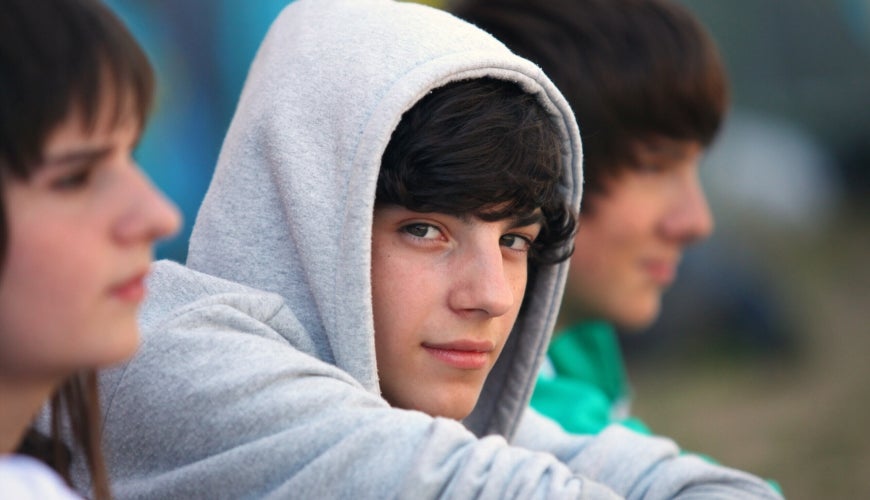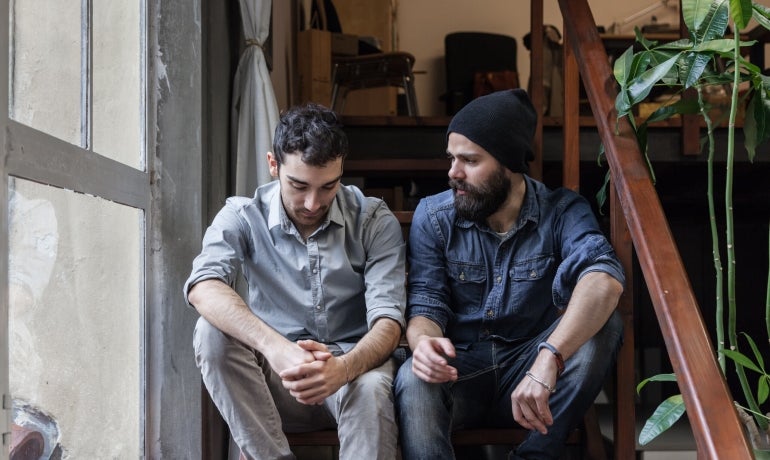Where does racism happen?
Our survey of 2380 young people aged 13-17 found that 89% had either experienced or witnessed racism. Racism most commonly happened at school (43%) or online (33%).

At school
Racism looks like: Being bullied for how you look, what you eat or what you wear, being made to feel different from other students or when teachers don’t stand up to racism when it happens.
“My son told me that his teacher said not to bother studying because people like him find it too hard to learn because their family’s big, and that he will just be made to go and get a job to support us all.”
— Mbali, 40
At home
Racism looks like: Family members criticising or making jokes about people from different racial backgrounds.
“In my family there are often racist comments made… I try to set an example by talking about my multicultural group of friends and colleagues and “normalising” the fact that we have an incredibly multicultural Australian community.”
— Emily, 19
Online
Racism looks like: Receiving harassing messages on Facebook, being on an email chain for offensive “jokes” or racist YouTube videos or comments.
“A friend received a Facebook friend request from someone they vaguely know with a swastika as his cover page. We shared his page and our disgust, tagging all mutual friends personally so they would see and encouraged them to do the same. Within 8 hours he had removed the photo and apologised.”
— Owen, 17
In public
Racism looks like: Being abused, being called names, being spat at, having things thrown at you or when people act aggressively to you.
"Around the footy club, humour is very important. But sometimes it can get to you. I was playing with my brother and they started calling us “the bombers”. Or they’ll go in hard in a tackle and call you a dirty Arab.”
— Yussef, 17
At shops or using services
Racism looks like: Not being served or being served after everyone else, being followed around by security or being treated unfairly compared to others.
“A club bouncer did not let me and a friend in. I am Sri Lankan, he is Indian … his excuse was that “we weren’t on the guest list”. A moment later, three of our white friends strolled into the club without so much as a glance from the bouncer.”
— Dinesh, 19
At work
Racism looks like: Being refused a job interview because of your name, being abused, teased or left out by workmates or not being considered for a promotion.
“When I was looking for a job, my resume said I spoke Arabic. I didn’t get one interview. When I took this off my resume I got four interviews. It might have been a coincidence.”
— Aisha, 20

In public spaces
Racism looks like: Being stopped or questioned by police or to show a train or tram ticket when others aren’t.
“I don’t think there is a day where I haven’t been asked to move on, or police have come over to us and asked us why we are hanging around. We do go around in big groups, but that is normal for us.”
— Jafar, 17
In the media
Racism looks like: When different racial groups are shown in an unfair or negative way in news reports, when media commentators make wild or inaccurate statements about people from a particular racial background or when people from different racial backgrounds don’t get included in TV shows.
“I am always shocked to see only white Australians on TV (unless you’re watching SBS or ABC), and especially on advertisements – Australian mums are always white!”
— Chailai, 36
There are no reasons or excuses for racism
It's just wrong. And in many cases, racism is against the law.
If you witness or experience racism, you may want to report it, seek support, or support those who have been negatively impacted. Explore the 'Responding to Racism' section of Racism. Its Up To Me website for information on services and reporting mechanisms available.
You can also get support or advice to deal with a difficult situation from organisations like Kids Helpline and ReachOut.
Racism. It Stops With Me
Further reading
- Commit to learning to address racism in a meaningful way on the It Stops With Me website
- Understand why racism is a problem?
- Explore who experiences racism?
- Review a guide to addressing spectator racism in sports
- Watch the Kep Enderby Memorial Lecture 2023 "Racism in Sport"
- Explore human rights teaching resources relating to racism
- Understand the Australian Human Right's Commission work on Race Discrimination
- Review the Australian Human Rights Commission's Anti-Racism Framework
